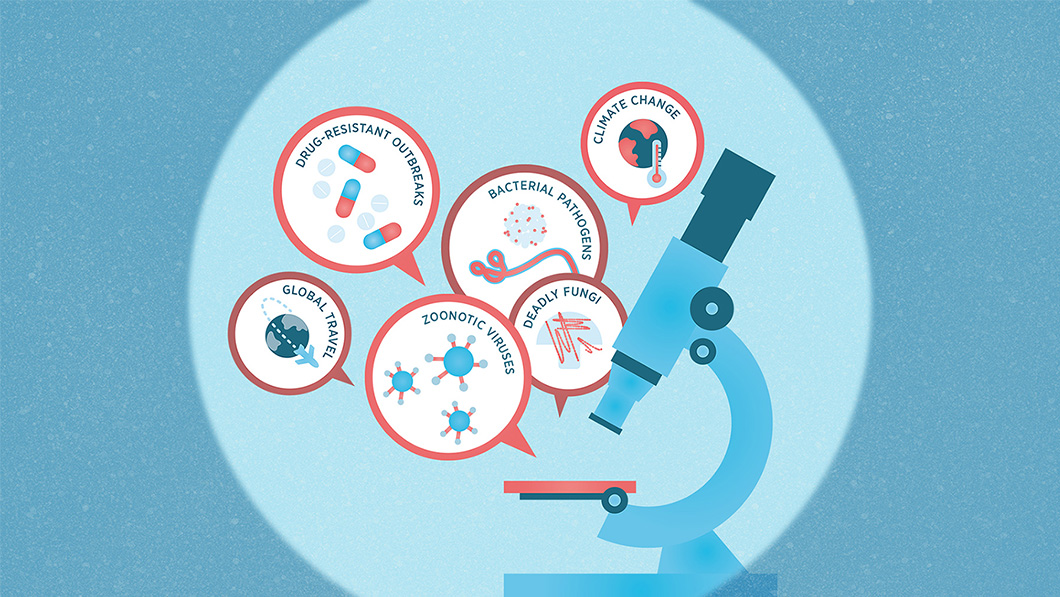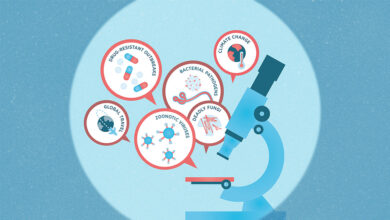
A bird flu strike, AI antibiotics and nuclear reactions
Sponsored by:

PPF: Health Security
PPF’s report The Next One: Preparing Canada for another health emergency outlines the lessons learned from the pandemic and how Canada can safeguard against future health emergencies. To keep the discussion going — and to keep Canadians informed — this newsletter looks at what’s happening in the world of health security each week. Here’s what we’re following:
Bird flu infects human
A person in Texas has reportedly tested positive for bird flu (H5N1), linked to an interaction with dairy cattle that are presumed to also be infected, according to health officials. The person’s symptoms were apparently mild — including eye redness — and were treated with an antiviral drug. It’s the first known worldwide instance of someone catching H5N1 from another mammal.
Despite the infection, the U.S. Centers for Disease Control still considers the H5N1 human health risk assessment to be low, but warned that anyone with prolonged, unprotected exposure to infected animals or birds could be at greater risk of infection. The human H5N1 infection followed news that dairy cattle in Kansas, Texas and Michigan were also either suspected or confirmed to be carrying the virus — which had been introduced to the herds by wild birds.
So far, there’s no evidence of any human-to-human transmission. But what if the virus does evolve to be more transmissible between humans? “There are actually vaccines licensed in the United States for H5N1, and there are stockpiles where we believe that, if we needed to, they would be reasonably good matches,” Dr. Peter Marks, director at the FDA’s Center for Biologics Evaluation and Research, said in Washington, D.C. last week at the World Vaccine Congress.
However, a former FDA official, Dr. Luciana Borio, told POLITICO that she was “not as confident.” The vaccines on hand, she said, are a two-dose regimen approved in 2007, and only reduced the risk of getting bird flu by 45 percent. Meanwhile, new research on the spread of H5N1 in South America found that H5N1 viruses infecting seals and seabirds in Argentina shared the same mutations for adapting to mammals as samples of the virus collected from a human in Chile — a finding the researchers called “alarming.”
On Wednesday, the largest egg producer in the U.S., Cal-Maine Foods Inc., said it has had to temporarily halt production after it found a positive case of bird flu in a facility in Texas. The company culled 1.6 million laying hens and 337,000 pullets (hens less than a year old) as a result of the outbreak.
Antibiotic AI
Researchers at Stanford Medicine and McMaster University have created a generative AI model to design new drugs to kill antibiotic-resistant strains of bacteria. The team tested their new AI tool, which they call SyntheMol (for “synthesizing molecules”) on drug-resistant strains of Acinetobacter baumannii, which infected 8,500 hospital patients in 2017 and caused 700 deaths across the U.S. that year, according to the CDC.
The SyntheMol AI model took only nine hours to generate about 25,000 possible antibiotics — and the recipes to make them — using data about how existing antibacterial chemicals worked against A. baumannii. Researchers then filtered those results to only focus on those that were dissimilar from existing compounds.
Eventually, six new compounds were found to kill A. baumannii in a lab setting — and they were also shown to fight other bacteria prone to antibiotic resistance, including E. coli, Klebsiella pneumonia and MRSA. Importantly, the six new compounds are “vastly different from each other and existing antibiotics,” according to a Stanford press release on the research. “The researchers don’t know how their antibacterial properties work at the molecular level,” the university’s release continued, “but exploring those details could yield general principles relevant to other antibiotic development.”
Dr. AI
Also in the world of AI this week: Doctors in the U.K. may soon be able to get a quick second opinion when prescribing drugs, thanks to an AI tool from Oxford University, DrugGPT. When prescribing, doctors will be able to enter a patient’s conditions, prompting the tech to offer recommendations or warnings about potential side effects or about how the drug might interact with other existing prescriptions. The team that led the project at Oxford’s AI for Healthcare lab says the tech “achieves performances competitive with human experts” in U.S. medical license exams. Previous research from the British Medical Journal has estimated that more than 237 million medication errors are made every year in England.
Elsewhere, the U.S. Food and Drug Administration approved a test that uses Artificial Intelligence to predict the risk of sepsis in patients. Prenosis, a Chicago-based company, trained an algorithm on more than 100,000 blood samples as well as clinical data on hospital patients to recognize health measures most associated with developing sepsis, and — based on 22 parameters — scored a patient along a risk scale of low to very high. Prenosis isn’t the first to develop something like this. An AI-based system from Epic Systems that alerts for signs of sepsis is already in use, but a 2021 study suggested that it missed two-thirds of sepsis cases, rarely found cases that were not already noticed by medical staff and often issued false alarms.
This week on WONK, Scott Balfour, the CEO of the utility Emera, talks about the road to net zero
The threat is real
In Ukraine, now in its third year of war with Russia, health security has become a pressing issue. The big threats include chemical, biological, radiological and nuclear hazards. The World Health Association announced that it is piloting a new tool in Ukraine to boost the preparedness of the country’s health system to manage such risks.
The tool, a health preparedness checklist, is “designed to assist health facilities in evaluating their capacity to manage a mass-casualty event stemming from a radiation emergency.”
The WHO said it was introduced across four regions in Ukraine, with a series of workshops and field visits at health facilities last month. They included areas that host nuclear power plants, which have been a big concern since Russia invaded Ukraine. Over the weekend, Ukrainian drones reportedly struck a shut-down reactor at a Russian-held nuclear plant. (There was no critical damage.) Russia attacked the same plant in 2022 when it was controlled by Ukraine.
“Preparedness for a radiation emergency response needs to be planned in great detail, perfectly coordinated, regularly exercised, and implemented by trained professionals,” said Emanuele Bruni, World Health Emergencies (WHE) lead in the WHO Country Office in Ukraine.
Canadians wait longer for surgeries
A new report from the Canadian Institute for Health Information shows that Canadians are now waiting longer for some critical procedures than they were prior to the pandemic. Last year, only 66 percent of patients had hip replacement surgery within the recommended 26-week benchmark period, compared to 75 percent who did in 2019 — even as the number of hip replacement surgeries increased by 18 percent. Only 59 percent of patients got knee replacement surgery within that same time frame in 2023, compared to 70 percent who did in 2019. Again, this was despite the overall number of knee replacement surgeries increasing by 15 percent during that time frame.
These averages hide some stark disparities between provinces. For example, only 21 percent of patients in P.E.I. had knee replacement surgery within the recommended 26-week period, versus 38 percent of patients in Quebec, 57 percent of patients in B.C., and 76 percent of patients in Ontario.
Wait times for some cancer surgeries increased, too. Compared to 2019, the median wait times for breast, bladder, colorectal and lung cancer surgery increased from two to four days between 2019 and 2023. For prostate cancer surgery, the median wait time increased by a full 11 days.
Events
April
-
April 8-13: Global Health Week. Charletson, SC.
-
April 15-17: Festival of Biologics. San Diego, CA.
-
April 15-17: Bio-IT World Conference & Expo. Boston, MA.
-
April 17-18: CMO Summit 360. Boston, MA.
-
April 23-24: Public Health 2024. Halifax, NS.
-
April 23-29: Intergovernmental Negotiating Committee (4th session). Ottawa, ON.
May
-
May 12-14: Bio€quity Europe. San Sebastián, Spain.
-
May 13-16: AAPS 2024 National Biotechnology Conference. San Francisco, CA.
-
May 13-17: PEGS Boston. Boston, MA.
Did someone forward you this newsletter? Subscribe to PPF: Health Security newsletter
This newsletter is produced by journalists at PPF Media. It maintains complete editorial independence.



